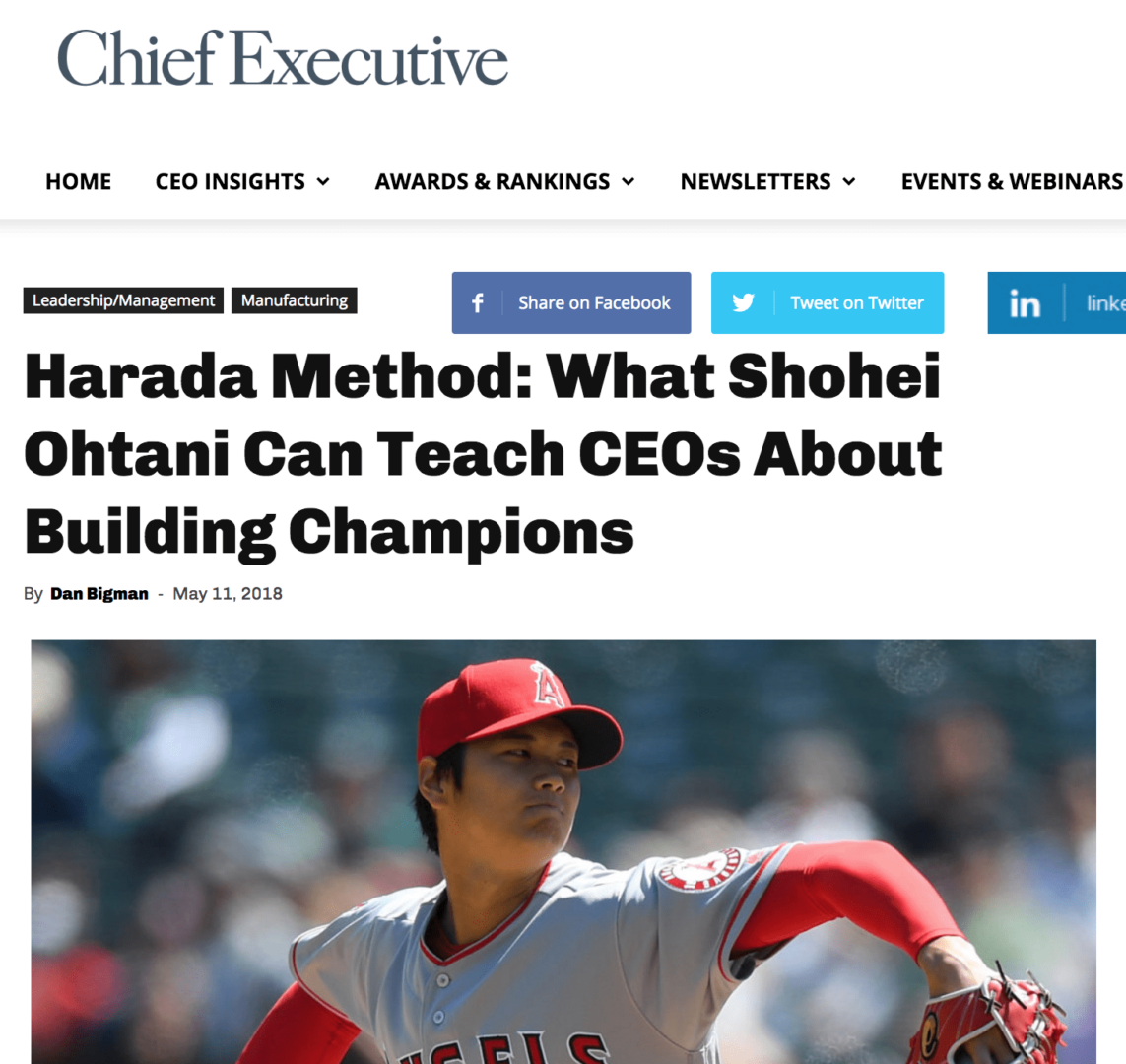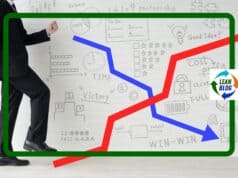I first learned about an approach to personal development called “The Harada Method” when Norman Bodek co-authored a book with Takashi Harada: The Harada Method: The Spirit of Self-Reliance. You can learn more from Harada's website.
Norman was a guest on my podcast in 2013 to talk about this method:
Through Norman, I first heard of a young Japanese baseball player, Shohei Ohtani. Over the past few years, he has talked about Ohtani and his dream to play in Major League Baseball in the U.S. as both a hitter and a pitcher.
Ohtani was a student of Mr. Sasaki, who was a student of Harada. Ohtani sketched out his plan for becoming a professional player in the Japanese league in Harada Method style (PDF link). How much did the Harada Method contribute to Ohtani's success?
Ohtani has now fulfilled his dream, playing this season with the Los Angeles Angels of Anaheim, having a first month that has been as exciting as any player's career. He has won three of the six games he has started as a pitcher, nearly throwing a perfect game in his first home start. He's also batting .348 with five home runs in the 20 games he has played as a designated hitter. No player since the legendary Babe Ruth has pitched and hit so well.
Ohtani in Action
A Recent Interview with Norman
I recently saw this article and interview with Bodek in Chief Executive Magazine:
Harada Method: What Shohei Ohtani Can Teach CEOs About Building Champions

The article says:
At 85, [Bodek] is increasingly convinced that in an era of sub-4% unemployment, deepening workforce skills gaps and increasing automation, the next explosive revolution in manufacturing will come from bringing out the best in every single worker–and the way to do it is the Harada Method. “You pick a goal,” he says. “What do you want in your life, just the way Ohtani did.”
I'm all for personal development, but I'm also reminded of the late, great W. Edwards Deming, who talked about how people work in a system and that “best efforts” are not necessarily enough.
“Hard work will not ensure quality. Best efforts will not ensure quality, and neither will gadgets, computers or investment in machinery.”
Elon Musk has (hopefully) learned this lesson about machinery, as I've blogged about.
I think we can have both:
- Personal development of individuals
- Leaders helping create a system in which people can be successful
As Norman talked about in our podcast, an individual's personal goals might not align with the organization's goals, which causes problems.
As he said in the Chief Executive interview:
“Now the challenge is, can people do what they want to grow, and it satisfies them and satisfies you at the same time? And that's what the Harada Method does.”
I guess we have to find “win/win” situations, as the late, great Stephen Covey talked about (listen to my interview with him). Harada learned from Covey, among others, as the Chief Executive article says
One thing that's interesting to me about the Harada Method is the focus on listing personal motivations. This reminds me of the coaching and conversation style of “Motivational Interviewing,” something I've been studying and have tried to practice somewhat informally in recent years.
In the Harada method, you sketch out goals, motivations, and purpose in four categories:
- “What's good for you materially?”
- “What's good for you immaterially, intangibly?”
- “Materially, what is good for other people?”
- “What's good for society in an intangible way?”
Bodek says:
“The more of these you write, the higher the motivation for you because you, as an individual, know exactly what you want now.”
Writing these goals reminds me of the process of evoking “change talk” (which includes the reasons why you should do something) from a person instead of “sustain talk” (the reasons why you can't or won't).
There are also connections to the Plan-Do-Check-Act (PDCA) or Plan-Do-Study-Adjust (PDSA) cycles readers of this blog are probably familiar with.
Have You Tried the Harada Method?
As much as I've been intrigued by the Harada Method, I've never formally tried it and I haven't gone through the training that Norman has suggested.
Have you tried the Harada Method? If so, what do you think? Has it been helpful?
Have you figured out how to balance individual development with systems improvement in organizations? Can you figure out both?
Here is a video webinar where Norman explains the Harada Method:
Please scroll down (or click) to post a comment. Connect with me on LinkedIn.
Let’s work together to build a culture of continuous improvement and psychological safety. If you're a leader looking to create lasting change—not just projects—I help organizations:
- Engage people at all levels in sustainable improvement
- Shift from fear of mistakes to learning from them
- Apply Lean thinking in practical, people-centered ways
Interested in coaching or a keynote talk? Let’s start a conversation.









![When Was the Last Time a Leader Around You Admitted They Were Wrong? [Poll]](https://www.leanblog.org/wp-content/uploads/2025/07/Lean-Blog-Post-Cover-Image-2025-07-01T212509.843-100x75.jpg)
I tried to apply some aspects of the Harada method. I took Bodek’s webinar and read the book. I found an annual process of creating a “64-chart” helpful–but also overwhelming.
The most helpful thing would probably have been a coach to guide the process and help to hold me accountable.
In that I don’t have a clear objective goal such as: “Olympic athlete” or MLB player to strive toward, it was hard to have a central focus to align all my objectives toward. I ended up with a large, unfocused collection of things I’d like to do. I made incremental progress, but nothing that stunning.
Having said all that, when I think about a company following Deming’s advice and “doing away with performance reviews”–the idea of using Harada Method or some similar coaching framework to help guide personal professional journeys would be very sensible.
Thanks for sharing your reflections on that, Andy.
Norman has offered me some coaching. I’m not sure if a goal like “have a successful speaking and consulting practice built around the ideas in my book Measures of Success is a good enough goal for using the Harada Method. Is that goal too narrow?
Hi Mark,
it is best to pick a goal that is both big and specific. Narrow is not a problem if you try to each depth. See your goal as your personal True North. From that you can think back 5 years from now and then 1 year. This one year goal should be concrete enough to follow the method more easily. (Read more on this in ‘The One Thing’ by Gary Keller.)
Your goal current goal – imho – is still vague. What do you mean by ‘successful speaking and consulting’? How do we know you’ve reached your goal?
Although, like with Toyota Kata, or any new skill for that matter, start small and slow. For your first project, pick a goal 3-6 months out and focus on following and learning the method. Which indeed requires a coach.
I wish you a lot of struggles, learning and fun on the way.
Arnout Orelio
(Certified Harada Method Trainer)
Thanks, Arnout! Great food for thought.
What are your experiences as a Certified Harada Method Trainer?
Hi Mark, thanks for asking. Sorry I didn’t reply sooner, but I didn’t get any notification, so I’m here by ‘coincidence’ ;-)
My experiences are as follow: I’m very thankful to Norman and Jim Lippens, my trainer, for making quality and ‘stick to the system’ the leading principles for certification. The Harada Method has great potential, if you treat it as a compleet system. Meaning, you use all aspects in concert. It is a great way to help people to become self-reliant. It takes determination, discipline and optimism however. There is no short cut to results.
What are your thoughts from this or my previous comment?
Let me know, when I can probe some more thinking :-)
I suggested to Norman that he contact baseball writers about Ohtani and The Harada Method and the Wall St. Journal published an article that mentions and quotes Norman:
How Shohei Ohtani Visualized His Baseball Success
The Japanese two-way sensation turned to a personal-growth technique called the Harada Method to help him achieve his goals